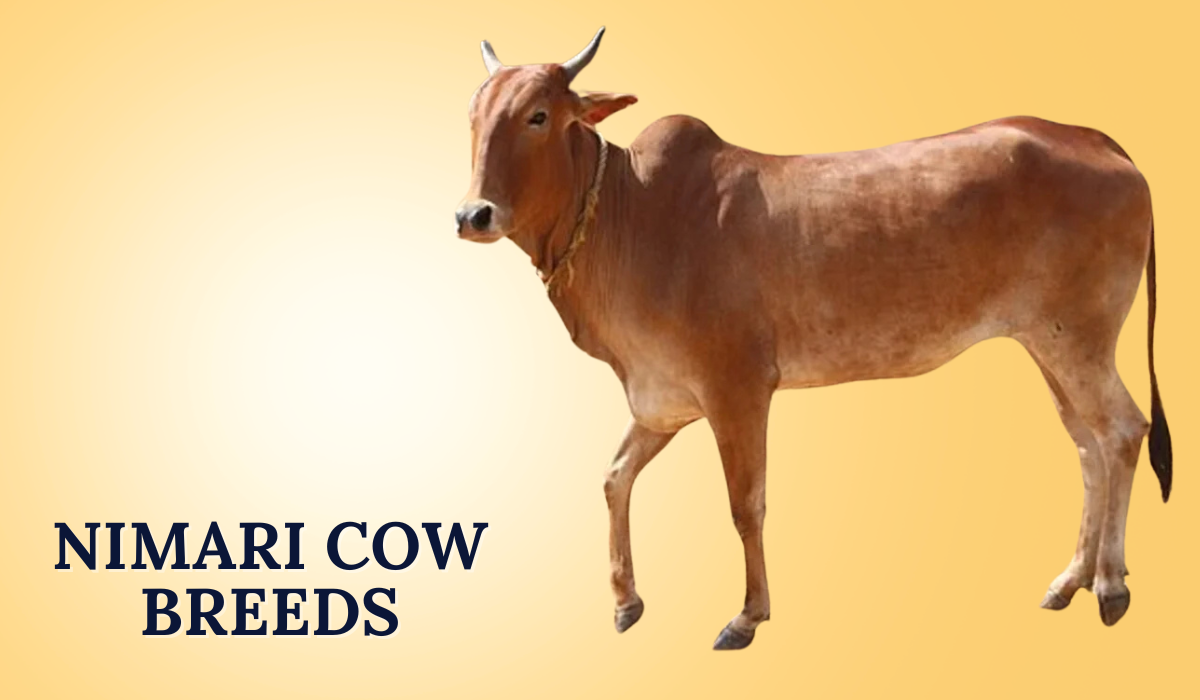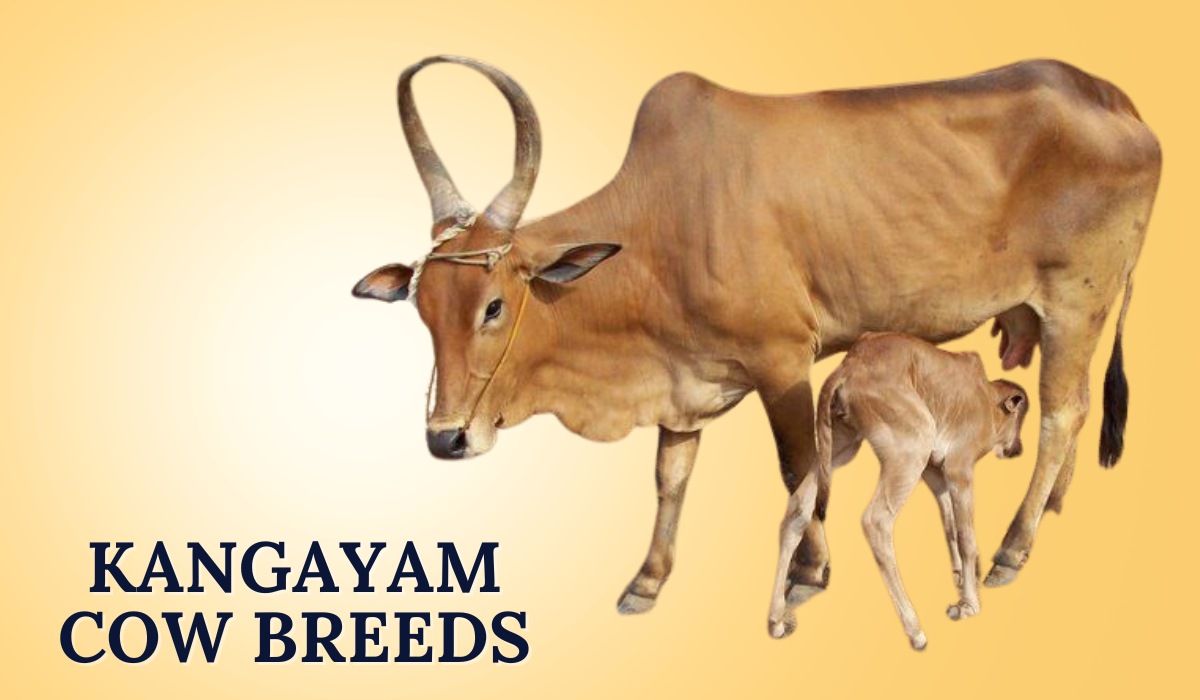The Nimari Cow Breeds in India are unique and important. Known for their adaptability and resilience, these cows thrive in the central and western regions of Madhya Pradesh. They have medium-sized body and can withstand harsh climatic conditions. The breed is highly valued for its milk production, rich in nutrients, making it a popular choice for dairy farmers.
Nimari cows are also known for their endurance and strength. This makes them ideal for labor-intensive agricultural work, especially in rural farming communities. In addition to their practical benefits, these cows hold cultural significance in the region. They are a symbol of traditional livestock farming, and local farmers take pride in preserving the breed’s purity.
With their gentle temperament and low-maintenance nature, Nimari cows contribute significantly to rural economies. Efforts to protect and promote the breed include initiatives aimed at improving breeding practices. These efforts support sustainable farming methods and ensure the continued prosperity of the Nimari cow in India.
Characteristics of Nimari Cow in Madhya Pradesh
Nimari Cow Breeds Milk Production and Pricing
Nimari Cow Breeds Milk per day typically ranges between 4 to 7 liters per cow. Some high-yielding individuals can produce more, depending on factors such as age, diet, and overall health. The milk produced by Nimari Cows is rich in fat and protein. This makes it an excellent source of nutrition for local populations.
People favor the breed for its high-quality milk, which they use to make dairy products such as ghee, curd, and buttermilk. The price of milk from the Nimari cow breed per liter in India typically ranges between ₹35 to ₹50. This price depends on factors like location and demand. Compared to other indigenous breeds, the price remains competitive. The Nimari Cow Milk price per kilogram is approximately ₹50 to ₹65.
This makes it an affordable and profitable option for dairy farmers in Madhya Pradesh. The price of Nimari Cow Milk also varies based on quality and fat content. Higher-fat milk is priced at the upper end of the scale.
The benefits of Nimari Cow Breeds Milk are numerous. Milk is known for its high nutritional value. It provides essential vitamins and minerals that support overall health. People often recommend milk to strengthen bones, improve digestion, and boost immunity. Additionally, it is especially beneficial for growing children and adults who require high-energy food sources.
Health and Disease Resistance of Nimari Cow
One of the most notable features of the Nimari Cow Breed is their resistance to diseases. These cows are highly resilient and have a strong immune system that helps them fend off common cattle diseases, including foot-and-mouth disease and mastitis. Their hardy nature makes them well-suited to areas with limited veterinary care, reducing the need for constant medical attention.
The disease resistance of the Nimari Cow Breed is further enhanced by its natural ability to adapt to local farming conditions. The breed is particularly resistant to heat stress, which is important for maintaining health and productivity during the hot months in Madhya Pradesh. This attribute also makes the Nimari Cow a reliable choice for dairy and draught purposes, as they can maintain good health even under challenging environmental conditions.
Additionally, the Nimari Cow Breeds Milk Price is stable, making it a reliable source of income. As Nimari Cows require less care than other breeds, the return on investment for dairy farmers is high. The consistent milk production, coupled with the ability to work as draught animals, ensures that the Nimari Cow is both economically viable and beneficial for rural economies.The Nimari Cow Breeds Donation is also a popular initiative in rural parts of Madhya Pradesh. Farmers who wish to help others improve their agricultural practices may donate Nimari Cows to poorer farmers or those in need, helping them establish a sustainable dairy business. This practice not only supports the local dairy industry but also contributes to improving the economic well-being of rural communities.
Nimari Cow Pregnancy and Babies
The Nimari Cow Breeds Pregnancy lasts approximately 280 days, similar to most other cattle breeds. Nimari Cows generally give birth to healthy calves that grow well and contribute to future milk production. Farmers prefer Nimari Cows because they have strong reproductive health, efficient calving rates, and produce healthy offspring.
Nimari Cow Breeds Babies are usually vigorous and robust, with the calves showing good growth potential and a strong appetite for their mother’s milk. As the calves mature, they inherit the desirable traits of the breed, such as good milk production and disease resistance. These qualities make the Nimari Cow a sustainable choice for farmers looking to expand their herd over time.
The Nimari Cow Breeds Praganency is generally uncomplicated, with minimal need for intervention during the calving process. This makes them an easy breed to manage, particularly for farmers who may not have extensive experience in cattle breeding. The cows typically calve once a year, ensuring steady milk production over time.
Nimari Cow Donation and Sustainability
The Nimari Cow Breeds Donation has become an important practice, particularly in areas where farmers need financial support to sustain their dairy businesses. Donations of Nimari Cows help improve the economic conditions of rural families and support the local dairy economy. This initiative has been instrumental in promoting the welfare of farmers in Madhya Pradesh, providing them with the tools they need for a sustainable livelihood.
In addition to milk production, Nimari Cow Breeds contribute to the fertility of the land. They use their manure as a natural fertilizer, enriching the soil and promoting sustainable farming practices. The combination of milk production and organic farming makes the Nimari Cow an essential asset in rural agriculture, fostering long-term sustainability in farming communities.
Conclusion :
The Cow Breeds In India are a valuable asset for farmers seeking high-yield milk production and a low-maintenance, disease-resistant breed. With an affordable Nimari Cow Breeds Price Under 50000, they offer excellent economic returns through their consistent milk production and additional use as draught animals. The Nimari Cow is also highly resistant to diseases, making them a reliable and sustainable choice for dairy farmers.
From their Nimari Cow Breeds Milk Benefits to their ability to adapt to difficult conditions, the Nimari Cow proves to be a vital breed for rural farming in India. Whether you are looking for a reliable milk producer or a hardworking draught animal, the Nimari Cow is an investment that ensures both immediate and long-term returns for farmers in Madhya Pradesh and beyond.



